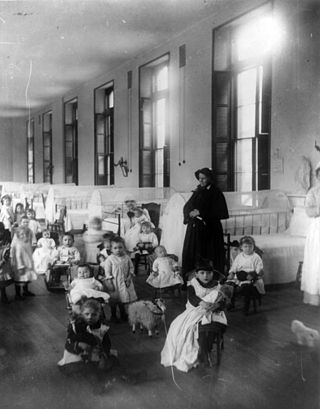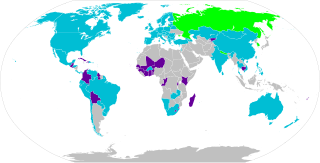Environment most often refers to:

Adoption is a process whereby a person assumes the parenting of another, usually a child, from that person's biological or legal parent or parents. Legal adoptions permanently transfer all rights and responsibilities, along with filiation, from the biological parents to the adoptive parents.

Flirting with Disaster is a 1996 American black comedy film written and directed by David O. Russell about a young father's search for his biological parents. It stars Ben Stiller, Patricia Arquette, Téa Leoni, Alan Alda, Mary Tyler Moore, George Segal, Lily Tomlin, Josh Brolin and Richard Jenkins. It was screened out of competition in the Special Screenings section at the 1996 Cannes Film Festival.
Paternity law refers to body of law underlying legal relationship between a father and his biological or adopted children and deals with the rights and obligations of both the father and the child to each other as well as to others. A child's paternity may be relevant in relation to issues of legitimacy, inheritance and rights to a putative father's title or surname, as well as the biological father's rights to child custody in the case of separation or divorce and obligations for child support.
A stepfamily is a family where at least one parent has children who are not biologically related to their spouse. Either parent, or both, may have children from previous relationships or marriages. Two known classifications for stepfamilies include "simple" stepfamilies, where only one member of the family's couple has a prior child or children and the couple does not have any children together, and "complex" or "blended" families, where both members of the couple have at least one child from another relationship.
Same-sex adoption is the adoption of children or adults by same-sex couples. It may take the form of a joint adoption by the couple, or of the adoption by one partner of the other's biological child or adult.
The international adoption of South Korean children started around 1953 as a measure to take care of the large number of mixed children that became orphaned during and after the Korean War. It quickly evolved to include orphaned Korean children. Religious organizations in the United States, Australia, and many Western European nations slowly developed the apparatus that sustained international adoption as a socially integrated system.
International adoption is a type of adoption in which an individual or couple residing in one country becomes the legal and permanent parent(s) of a child who is a national of another country. In general, prospective adoptive parents must meet the legal adoption requirements of their country of residence and those of the country whose nationality the child holds.
Closed adoption is a process by which an infant is adopted by another family, and the record of the biological parent(s) is kept sealed. Often, the biological father is not recorded—even on the original birth certificate. An adoption of an older child who already knows their biological parent(s) cannot be made closed or secret. This used to be the most traditional and popular type of adoption, peaking in the decades of the post-World War II Baby Scoop Era. It still exists today, but it exists alongside the practice of open adoption. The sealed records effectively prevent the adoptee and the biological parents from finding, or even knowing anything about each other. However, the emergence of non-profit organizations and private companies to assist individuals with their sealed records has been effective in helping people who want to connect with biological relatives to do so.
Open adoption is a form of adoption in which the biological and adoptive families have access to varying degrees of each other's personal information and have an option of contact. While open adoption is a relatively new phenomenon in the west, it has been a traditional practice in many Asian societies, especially in South Asia, for many centuries. In Hindu society, for example, it is relatively common for a childless couple to adopt the second or later son of the husband's brother when the childless couple has limited hope of producing their own child.
Abandon, abandoned, or abandonment may refer to:

Islamic views on adoption are generally distinct from practices and customs of adoption in other non-Muslim parts of the world like Western or East Asian societies. Adoption in the western sense of the word is not recognized in Islam.
Animal rescue or pet rescue may refer to:

The topic of Islam and children includes Islamic principles of child development, the rights of children in Islam, the duties of children towards their parents, and the rights of parents over their children, both biological and foster children.
Beast most often refers to:

The Hague Convention on Protection of Children and Co-operation in Respect of Intercountry Adoption is an international convention dealing with international adoption, child laundering, and child trafficking in an effort to protect those involved from the corruption, abuses, and exploitation which sometimes accompanies international adoption. The convention has been considered crucial because it provides a formal international and intergovernmental recognition of intercountry adoption to ensure that adoptions under the convention will generally be recognized and given effect in other party countries.
Adoption in Australia deals with the adoption process in the various parts of Australia, whereby a person assumes or acquires the permanent, legal status of parenthood in relation to a child under the age of 18 in place of the child's birth or biological parents. Australia classifies adoptions as local adoptions, and intercountry adoptions. Known child adoptions are a form of local adoptions.
The following outline is provided as an overview of and topical guide to adoption:
LGBT parents in Canada have undergone significant progress in terms of both legal and social acceptance. Same-sex couples who wish for parenthood now enjoy equally the possibilities, responsibilities and rights of opposite-sex couples. Following the nationwide legalization of same-sex marriage in 2005, the number of LGBT families in Canada has increased substantially, paving the way for same-sex couples' aspirations of having their own children. Legal methods of assisted reproduction range from insemination via IVF through to surrogacy arrangements.
A stepchild is the offspring of one's spouse, but not one's own offspring, either biologically or through adoption.




